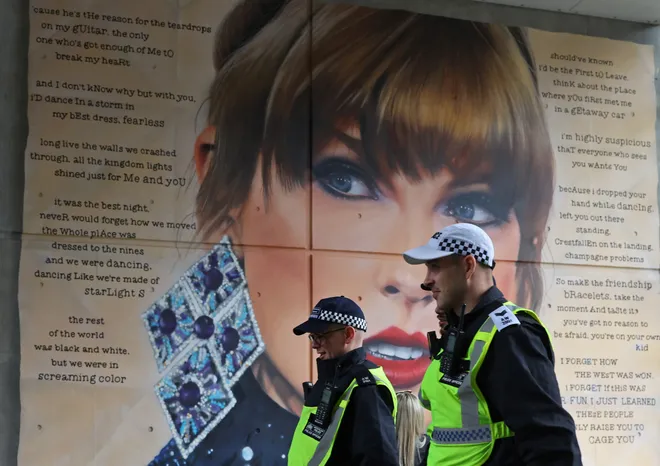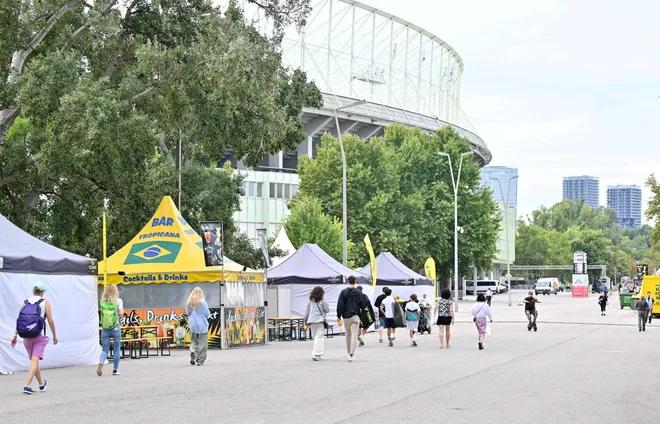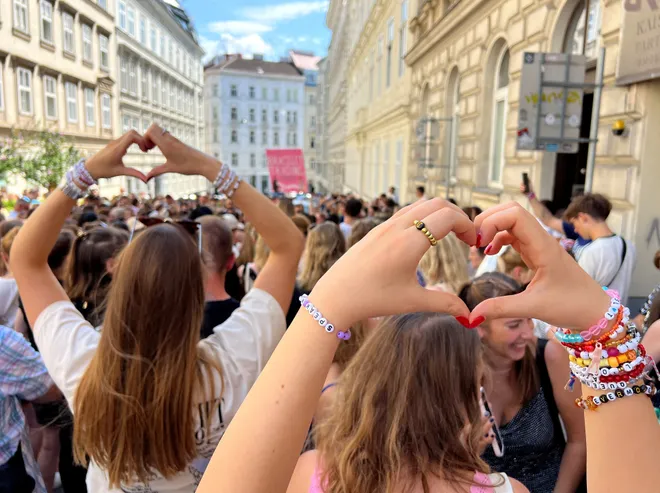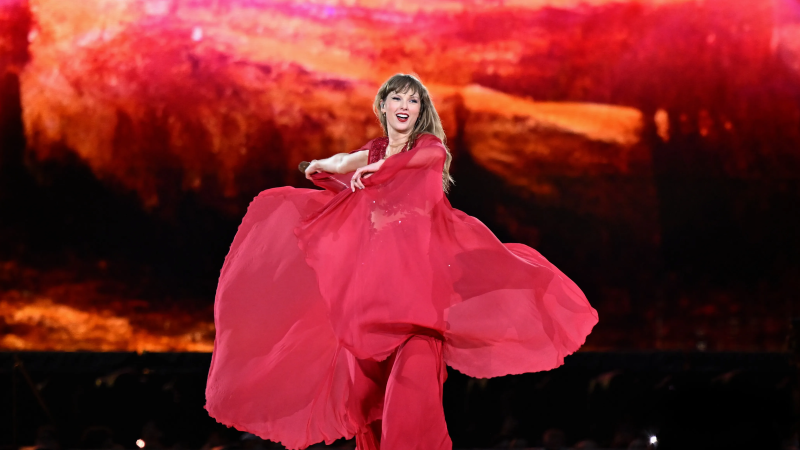London security ramps up ahead of Taylor Swift's Eras Tour, safety experts weigh in
NASHVILLE — "I feel bad for whoever sits behind us," laughs Marge Haines.
The 69-year-old mom is talking with her two daughters, Abby Luna and Val Haines, in Abby’s Tennessean kitchen about heading to Taylor Swift's Eras Tour in London. Marge smiles wide as her bedazzled "We are never getting back together. Like ever." T-shirt sparkles in the kitchen light. She plans to wear the "Red" themed-tee to Wembley Stadium on Aug. 19.
"Yeah, I think especially all three of us together," adds Val, 38.
"We’re a loud group of women," quips Abby, 40, and everyone laughs.
The three reminisce about when they became fans of Swift. For sisters Val and Abby, they gawked over the teen starlet in 2006.
Need a break? Play the USA TODAY Daily Crossword Puzzle.
"We’ve been fans for 18 years," Abby says. "We saw Taylor open for Rascal Flatts in Knoxville in 2006."

Although three of the Eras Tour shows were canceled in Vienna due to a thwarted terrorist plot, the sisters and mom are not afraid to head to the United Kingdom for Swift’s final European stop.
"Taylor is not going to put people’s lives in danger," Abby says. "I’m glad she canceled the Vienna shows, and if she has to cancel London, so be it. We will still go, and we’ll be the Swifties singing in the street like they did in Vienna."
"I’m a little concerned," says Marge, "but I’m concerned when I go to Kroger. I always want to know where my exit is. I go to the Titans games and I’m concerned about how I get out, but I’m not going to let that stop anything."
The London Metropolitan Police Department tells USA TODAY "there is nothing to indicate that the matters being investigated by the Austrian authorities will have an impact on upcoming events here in London."
Wembley Stadium has added additional security measures for the five shows. On the arena’s website, the venue states it will not allow overnight camping and fans without a pass will be "moved on."
"The Met works closely with venue security teams and other partners to ensure there are appropriate security and policing plans in place," a London police spokesperson says. "As always, we will continue to keep any new information under careful review."
The mayor of London, Sadiq Khan, stated last week, "We’re going to carry on working closely with police, ensuring that the concerts can take place in London safety."
Swift has not publicly acknowledged the canceled shows. The singer usually posts a statement to her Instagram story after news of postponements.
After postponing one of her Rio de Janiero shows in the fall of 2023, the singer wrote on Instagram, "The safety and well being of my fans, fellow performers, and crew has to and always will come first." Following the death of three children stabbed last month in Southport, United Kingdom, while attending a Taylor Swift-themed dance class, the singer wrote, "The horror of yesterday's attack is washing over me continuously and I’m just completely in shock."

Vienna would have been a 'soft target' attack
"If you go through security — you’ve been vetted, you’ve been inspected, you’ve been sensed — and generally you’re in a secure area making you a hard target," says Carey Rapport, a distinguished professor of electrical and computer engineering at Northeastern University and expert in event security checkpoints. "But as you’re lining up for the security line, if you’re a pedestrian on a sidewalk or you’re approaching a stadium and haven’t gone through security, you’re a soft target."
According to authorities, the 19-year-old Austrian police arrested last week had planned to strike in a soft target area outside of the Ernst-Happel Stadium.
"He wanted to carry out an attack in the area outside the stadium, killing as many people as possible using the knives or even using the explosive devices he had made," said Omar Haijawi-Pirchner, the head of the Austrian Directorate of State Security and Intelligence. Officials added the suspect recently quit his job and swore allegiance to ISIS.

"Large venues can unfortunately be kind of a tempting target for terrorist organizations, especially jihadist organizations that often try to create a message," says Corrinne Zoli, a part-time instructor at the Forensics and National Security Sciences Institute at Syracuse University. Zoli’s research focuses on global conflict dynamics and patterns.
"Terrorist organizations like to hurt young people, because these create huge news cycles that they consider advantageous to spreading the terrorist message of fear," she says. "This is their game."
When Swift turned 30, she shared with Elle Magazine her biggest fear — after the Manchester Arena bombing in 2017 during an Ariana Grande concert and the Las Vegas mass shooting that year during a Jason Aldean show — would be keeping her fans safe. In both instances, the attackers were outside of the venues.
"I was completely terrified to go on tour this time," Swift wrote in the 2019 article, "because I didn’t know how we were going to keep 3 million fans safe over seven months. There was a tremendous amount of planning, expense, and effort put into keeping my fans safe. My fear of violence has continued into my personal life."
Swift’s Eras Tour has broken records as she performs for more than three hours many of her hits from 11 era albums. Fans share bonding experiences. Mothers and daughters cry during “Marjorie.” Fans propose during "Love Story."

"If I were advising her," Zoli says, "I would tell her to be mindful of the fact that you don’t want that personalized experience to be overshadowed or associated with this kind of terrorist threat. And not just the fear associated with it, but all the baggage that ISIS carries and Islamic State carries."
Security expert says technology may assist in the future
Swift is no stranger to world tours. She’s performed six since 2009 bringing her show-stopping talents across the world for her "Fearless," "Speak Now," "Red," "1989" and "Reputation" albums before embarking on the Eras Tour.
"There’s initial planning and then as the event gets closer, those plans are constantly reviewed and adjusted based on the threat environment and intelligence that may be available to local law enforcement, federal state partners as well as venue managers," says Don Erickson, the CEO of Security Industry Association, a global security, solution-based association that represents more than 1,500 companies. "It’s not a situation where there’s planning at the initial stage and it’s never touched again or updated. There’s an evolving strategy based on threats — known threats, potential threats — and that’s modified, strengthened leading up to the event."
Erickson sees venues adding more security measures like facial recognition technology and expanded law enforcement perimeters.
"Facial recognition technology is reliable," he says. "You see it at the airports. It’s seamless, and you can have individuals come into a stadium fairly quickly and safely. I also think you’re going to see more of a strategy further out from the venues around the perimeter. Cameras may be used to look for anomalies in traffic patterns by identifying and confirming the number of people in a given area like a densely populated area of the venue which may be a high target."
As Swift wraps her European leg with five shows in London, she prepares for her return to North America. The singer will conclude her two-year stint in Miami, New Orleans, Indianapolis, Toronto and Vancouver, Canada.

Don't miss any Taylor Swift news; sign up for the free, weekly newsletter This Swift Beat.
Follow Bryan West, the USA TODAY Network's Taylor Swift reporter, on Instagram, TikTok and X as @BryanWestTV.
Disclaimer: The copyright of this article belongs to the original author. Reposting this article is solely for the purpose of information dissemination and does not constitute any investment advice. If there is any infringement, please contact us immediately. We will make corrections or deletions as necessary. Thank you.







